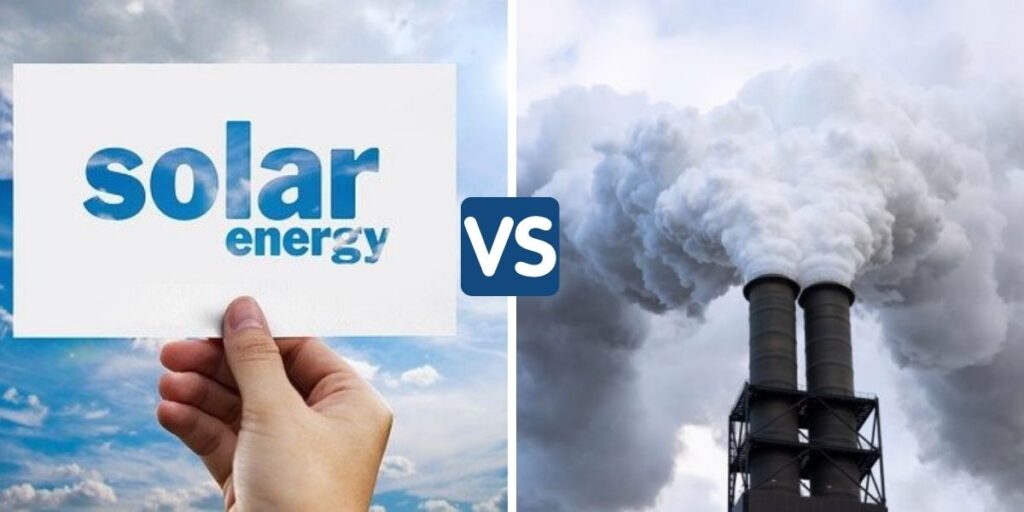If you’ve been following the continued battle between solar power vs fossil fuels, it’d appear to be the dominant resources on which the worldwide economy depends oil, coal, and fossil fuel are going to be utterly phased out of existence within the near future.
In reality, these resources still power most of the world, whereas renewable resources like solar and wind solely contribute some 2 to 3 per cent of worldwide energy capacity. This reality check implores the following question: how does solar gather against fossil fuels? In this article, we will compare solar power to fossil fuels so that you can understand the differences.
Solar energy VS fossil fuels
There are tons of pros and cons of renewable energy and fossil fuels, too. Both have an enormous impact on the environment, on the energy sector, on lifestyle – and therefore the way forward for humanity.
Solar energy will never run out. Meanwhile, fossil fuels will. While fossil fuels will run out in 50 years, renewable energy is here and can never run out.
But fossil fuels are relatively easy to store, which unfortunately it. Could not be said for renewable energy sources? Nowadays there are some energy storage technologies, but they’re still in their beginning. They’re not efficient enough – yet. And it’s even worse if we expect of large-scale plants.
And although solar energy will never run out, they’re unfortunately not available continuously. When the weather is cloudy, solar panels aren’t efficient enough. If the wind isn’t blowing, the wind turbines won’t rotate.
But – most importantly– solar energy is clean, which suggests that it doesn’t pollute the environment. If we would like humanity to survive longer than non-renewable energy sources, then we certainly got to stop pollution and heating.
However, these arguments don’t yet explain why the utilization of gas is increasing far more than solar power.
Read next: How To Choose The Best Solar Panel For You
Why is solar energy better than energy from coal?
Coal-fired power has been an inexpensive source of energy and electricity since the start of the economic revolution. Reasonable and abundant, people often neglected coal problems due to its low price. However, as fuel, solar power is free and clean. As a result, many of us believe that solar energy will eventually overtake coal as our primary source of electricity. Solar is a newer technology, with issues that likely are going to solve over time.
Is solar energy cheaper than fossil fuels?
Accessing power straight from the source makes more sense than paying for it indirectly from your local power station. Solar energy is less expensive than “regular” or ordinary electricity.
Consistent with the world Economic Forum (WEF), launching new solar panels is affordable than a similar purchase in coal, gas, or other fossil fuel choices. One way to understand it’s that the sun isn’t going anywhere (for now), then it’s what’s referred to as a natural resource.
It takes tons of labor to supply electricity, but once you found out your very own private power plant on the roof of your house, that’s the definition of efficiency. Harnessing the facility of the sun cuts out the negotiator.
The world’s best solar energy schemes now offer affordable electricity in record with the technology more flawed than coal and gas in most major countries.
Why is it better to use solar energy?
The most commonly recognized truth about solar power is that it indicates a healthy, fresh source of energy. Solar energy is an excellent way to scale back your carbon footprint. There’s nothing about solar energy that contaminates nature.
Solar power doesn’t release any greenhouse gasses, and apart from needing a source of unpolluted water to function, it uses absolutely no other resources. Hence, it’s safe and environmentally-friendly.
Frequently Asked Questions (FAQ)
What is the disadvantage of using solar energy instead of energy from fossil fuels?
Firstly, The quantity of sunlight varies throughout the day. Secondly, solar power panels are inefficient in tropical regions.
Moreover, Unreasonable use of solar power results in the pollution of the atmosphere—furthermore, Use of solar energy results in global climate change.
How can we use fewer fossil fuels?
Few of the ways to use fewer fossil fuels are; Buy food that’s locally produced. If it’s manufactured at a farm nearby, then less energy is needed to move it.
Is coal the cheapest energy source?
Of all the fossil-fuel sources, coal is that the least expensive for its energy content and maybe a significant factor in the value of electricity within the United States.
What is the cheapest fossil fuel?
Of course, coal is cheap, but gas is more affordable, and gas is eradicating coal in competitive markets. Atomic power has low fuel costs without CO2 emissions. Solar and wind don’t have any fuel expenses and no air emissions.
Is renewable energy cheaper in the long run?
Even if a sustainable source of energy costs more upfront, it’s going to be cheaper within the end of the day.
Conclusion
Solar power is independent and inducting solar panels on your roof is a sensible and effortless path to contribute to a sustainable future. Starting on your house is excellent thanks to showing you care about the environment.
But that growth is occurring. Year-after-year more and more people realize that not only can they afford a solar power system, but that system also can save them money on their utility bills.

